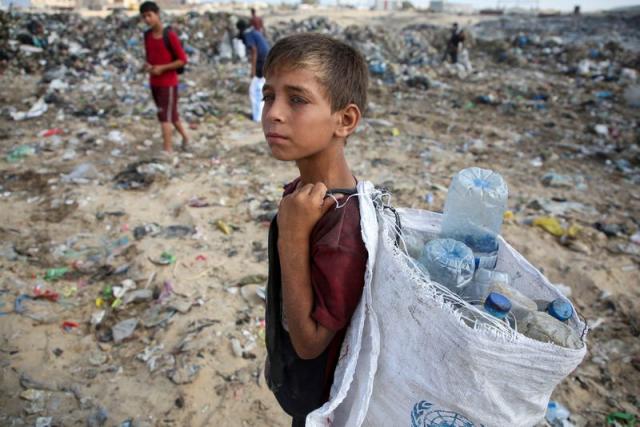
Bulldozers plough through piles of waste, but angry residents find little relief as their children sift through garbage on Gaza’s streets in a growing sanitation crisis that’s adding to the misery of war.
“We can’t sleep, we can’t eat, we can’t drink, the smell is killing us,” said Ahmed Shaloula, one of many displaced Palestinians, who is from Gaza City and lives in Khan Younis.
Palestinians have faced one crisis after another since the conflict erupted between Israel and the Palestinian militant group Hamas in October. Aside from Israeli air strikes, shelling and a ground offensive, Palestinians are crippled by shortages of food, fuel, water, medicine and functioning hospitals.
Garbage is piling up in the impoverished enclave — one of the world’s most densely populated places — which has been reduced mostly to rubble. At night, people stay awake fighting mosquitoes and some are catching diseases like scabies, Shaloula said.
“We are calling on the municipality of Khan Younis to remove the waste.”
But the call for government services is wishful thinking in Gaza after nine months of war, which erupted when Hamas attacked Israel, killing 1,200 people and taking about 250 people hostage, according to Israeli tallies.
Israel responded with an offensive that has killed more than 38,000 people, according to Gaza health authorities.
Khan Younis is the second-largest city in Gaza, home to 2.3 million people.
Damage from the war and a shortage of fuel have created a waste problem, said Omar Matar, the official responsible for the removal of solid waste at Khan Younis Municipality.
“The piling up of waste has led to bad smells, spread of insects and rodents in addition to the leakage of liquids from the waste to the underground water reservoir,” he said.
The reservoir is the main source of drinking water for residents of Khan Younis. Clean water is unavailable in most of Gaza.
“This dumping land was not correctly designed to stop the leakage of waste liquids into underground water,” said Matar.
(Writing by Catherine Cartier; Editing by Michael Georgy and Sharon Singleton)



